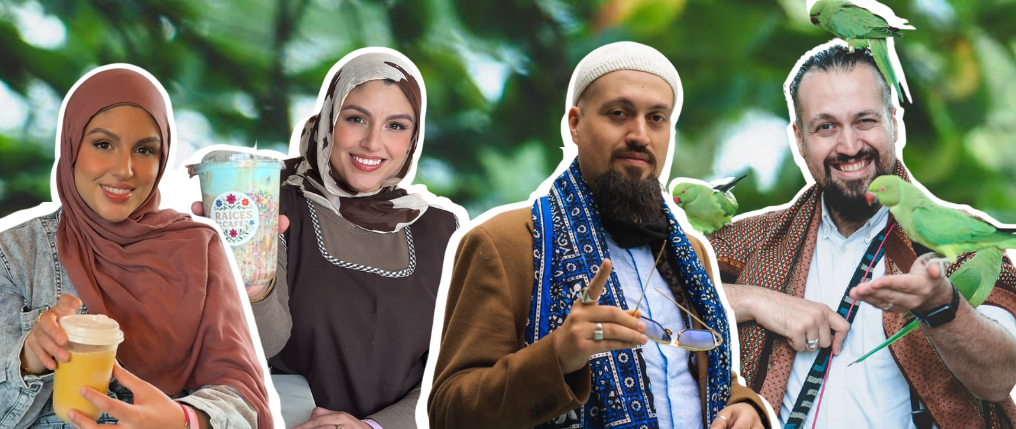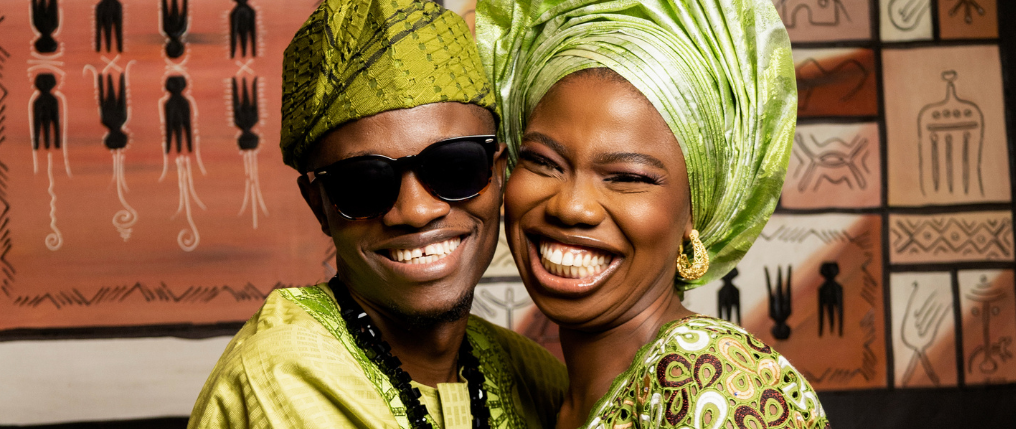
Faith and Family in Love: Latin and Hispanic Heritage Month
October 10, 2025

This Latin and Hispanic Heritage Month, we spoke with Ana and Isa on how embracing Islam transformed their approach to relationships, the Latin values that continue to shape their journeys as revert Muslims, and why greater visibility matters in spaces where love, faith, and family intersect. Ana is a Honduran-American coffee cart shop owner based in Dallas, and Isa is a British-Colombian artist, activist, and trustee of the Latin Muslim Association based in London.


Looking for your soulmate?
You won’t find your soulmate on this blog post but you might find them on Muzz - the world’s biggest Muslim dating and marriage app.
When it comes to love and marriage, Latino and Latina Muslims are often left out of the wider conversation, despite being a growing and deeply connected community across the US and UK. Their stories offer a rare glimpse into how cultural heritage and Islamic guidance come together to redefine what Muslim relationships can look like today.
When you embraced Islam, did your view on love or marriage shift? If so, how? Were there any misconceptions you had about Muslim relationships before you reverted?
Ana (US): I came to understand what it truly means when people say marriage is “half our deen.” At first, I saw marriage mainly as companionship and building a family. Through the teachings of the Quran, I learned that Allah SWT places mercy and tranquility in a blessed marriage, but it is also a test for both partners. There will be disagreements and challenges, and it takes more than love to get through them. It requires mutual respect, trust, and strong communication to find grace with one another and repair the relationship. I find it beautiful that Islam provides so much guidance on what a healthy marriage looks like. It is not one without trials, but one rooted in mercy and peace that strengthens its foundation.
Isa (UK): In modern times you are taught to avoid responsibility; it is about money first, family later. Back home it is kind of like this too; you stay with your parents until you are educated and have a career before moving on. When Islam came into my life it made me reevaluate. Allah left us Islam and Islam makes it clear what you can and cannot do. Either go with it or reject it. That took some convincing. It is not like when my abuelos were young and it was easier to start a family. Maybe it is not culture clash but economic capitalism that is clashing with love and family life. I used to think that if we just followed the rules of Islam, everything would be perfect. But we are not perfect; we are flawed creatures. We still need to work hard at it every day. As I mature, I understand that more.
What Latin values have you carried over into your journey as a Muslim? What similarities do you see between Latin and Muslim cultures when it comes to love and relationships?
Ana (US): The value of supporting and caring for one’s family is a deep-rooted Latin value that I’ve carried with me on my journey of embracing Islam. Growing up, I watched my father not only provide for our family but also be actively involved at home, cooking and helping maintain the household. That balance reminds me of the teachings of Islam and the example of Prophet Muhammad (ﷺ), who was known for his kindness and support toward his wives. Both Latin and Muslim cultures place a strong emphasis on family, love, and care, showing that love is shown through actions, whether it’s providing, nurturing, or simply being present for one another.
Isa (UK): For us, family is everything. Come rain or shine, family will always be there for every tear and every laugh. My family is a bit special; they are not heavy drinkers, very health conscious. My abuelo is a doctor, in his 90s now and still practising; such a character. What he taught me is lead your words by example, and fix your relationship with God before you go to others. It is a humble approach to God. Even my great aunties are always telling me to pray, even for the small things. Even if it is just rolling a dice in a game of Ludo, always pray. I think I learnt about God through them.
Latin culture is often passionate and expressive. How has that shaped the way you show love in a Muslim context?
Ana (US): I value a spouse who can meet me with daily greetings of a hug and a kiss. In my culture, we also grow up constantly hearing words of admiration and encouragement from our families, so words of affirmation are deeply meaningful to me. These small, consistent actions are what make us as Latinos passionate and expressive. It is not always about grand gestures, but about continually showing love through simple, everyday acts of care and affection.
Isa (UK): That is probably where my words would be followed with spontaneous dancing and serenading. I do not think other cultures are ready for that kind of public display just yet!
Do you feel represented in the Muslim community as a Latino/Latina revert, especially when it comes to conversations about love and marriage?
Ana (US): No, it can sometimes feel like there is a stereotypical portrayal of Latina Muslims in conversations about love and marriage. Latinas and Latinos come from over 20 different countries, each with unique histories, ethnicities, and cultural norms. This creates a rich and complex matrix of what it means to be Latino. We don’t all eat the same dishes, we don’t all speak the same dialect, and we don’t all dress culturally the same. Our cultures are too diverse and layered to be reduced to one narrative or token representation, even as we continue to grow as an important minority within the Muslim community.
Isa (UK): No, I do not feel represented. We get mentions in our food, but often we are looked at like exotic creatures. It is the same orientalist gaze that Arab and Persian Muslims have faced; except now Muslims do it to us. We are a rich community with a unique culture, forged on a young continent. We have suffered; we have laughed after suffering. So as Muslims, no. In wider society, even less. No one understands our history. We are glamourised through narcos and civil wars. But we are more than our suffering. We are a people who always overcome.
Do you feel Latin Muslims get enough visibility in the wider Muslim community? How can this be changed?
Ana (US): We might get invited into the room, but I don’t feel like we are always invited to speak at the table. Many of us have started creating our own spaces where we can fully be ourselves. Houston is home to the first Latino-led Islamic center in the U.S., and there are thriving Latino-run communities in places like Chicago and New York/New Jersey, SubhanAllah. These spaces are vital because, so often, the greater Muslim community expects us to conform to their cultural practices rather than embrace the beauty of our own.Allah reminds us in the Quran: “O humanity! Indeed, We created you from a male and a female, and made you into peoples and tribes so that you may get to know one another. Surely the most noble of you in the sight of Allah is the most righteous among you. Allah is truly All-Knowing, All-Aware.” (49:13) This verse is a powerful reminder that our diversity is a blessing, and that visibility and representation are not just about being seen, but about being valued for who we are.
Isa (UK): No, I do not think Latin Muslims get enough visibility. But maybe we are not large enough yet. Some of us blend in physically with other groups, so people do not notice us. In the USA I hear good things; the community has found its voice and runs its own projects. I am a trustee of the Latin Muslim Association; we are a humble charity that supports little pockets across South America to grow Islam in a Latin way; not a Gulf way, not a Maghrebi way. It is not for others to define us, but for us to stand up and talk.
How can the Muslim community better include and celebrate Latin voices, especially when talking about marriage and family?
Ana (US): Not all, but many Latina and Latino Muslims come from families where their parents are not Muslim or where not everyone practices the same religion. To better include Latino voices, the Muslim community should also make space for our friends and family at Muslim events. For many of them, this may be their first experience seeing how Muslims treat their newly reverted loved one. It is an opportunity to demonstrate the true teachings of Islam by being non-judgmental, welcoming, and supportive. When our families feel respected and included, it not only strengthens our faith journey but also builds bridges of understanding and love between communities.
Isa (UK): To me, representing Latinos and Muslims together means remembering that Allah made us into nations and tribes so we may know one another. The fall of Andalusia, caused by complacency in the Muslim empire, led to the conquest and suffering of South America. How different life could have been if Muslims had not lost sight of the gifts Allah gave them. But it was written, and those effects ripple through to other nations. And here we are today. If Muslims learned Latino history, they would see how close we are to God. We live in lush, green lands, but people are disillusioned with the church. They want God. If Muslims understood the Latino world, it would be easier to reach out and show how close and similar we are. To my Latino Muslims, remember the values of our community; that is the foundation. Islam only strengthens that. We are a people where even our country folk are part of us; it is all about building your own family.

